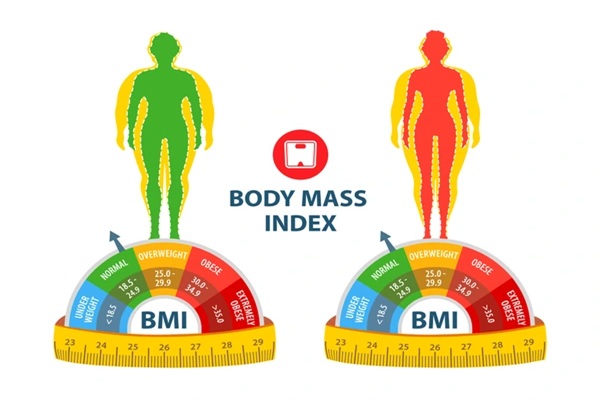Ideal Weight Calculator
Find your ideal weight range based on height, gender, age, and body frame using multiple scientific formulas. Understand what a healthy weight means for your body type.
Ideal Weight Calculator
Discover your ideal weight range based on height, gender, age, and body frame using scientifically validated methods
How To Use This Calculator
Enter Your Information
Input your gender, height, age, and select your body frame size using the measurement guidance provided.
Choose Formula Method
Select which formula to use, or keep "All Formulas" selected to compare results from multiple scientific methods.
Get Your Results
Review your ideal weight range, detailed results by formula, and recommendations adjusted for your unique body frame size.
Important Information
Remember that ideal weight ranges are guidelines, not absolute rules. Health is determined by many factors beyond weight, including fitness level, body composition, and metabolic health. Consult with healthcare professionals for personalized advice.
Enter Your Details
Fill in your information to calculate your ideal weight range
How to determine your frame size: Wrap your thumb and middle finger around your wrist. If they overlap, you likely have a small frame. If they touch, medium frame. If they don't touch, large frame.
How Ideal Weight Is Calculated
BMI Method
The Body Mass Index (BMI) method determines ideal weight based on a healthy BMI range of 18.5-25. The formula is:
Weight (kg) = BMI × Height² (m)
For example, a person who is 170 cm tall (1.7 m) would have an ideal weight range of 53.5 kg to 72.3 kg based on the healthy BMI range.
Devine Formula
The Devine formula was originally developed for medication dosages and is one of the most widely used methods:
Men: 50 kg + 2.3 kg per inch over 5 feet
Women: 45.5 kg + 2.3 kg per inch over 5 feet
This formula provides a single ideal weight value rather than a range. It's commonly used in medical and pharmaceutical settings.
Robinson Formula
The Robinson formula is a variation of the Devine formula with slightly different coefficients:
Men: 52 kg + 1.9 kg per inch over 5 feet
Women: 49 kg + 1.7 kg per inch over 5 feet
This formula tends to give slightly lower ideal weights than the Devine formula, especially for taller individuals.
Frame Size Adjustment
Body frame size significantly affects ideal weight. After calculating the base ideal weight, our calculator applies these adjustments:
Small frame: -10% from base calculation
Medium frame: No adjustment
Large frame: +10% from base calculation
Your frame size is determined by wrist circumference relative to height. People with larger frames naturally have more bone and muscle mass.
Why Multiple Formulas?
Different formulas were developed for different purposes and populations. No single formula is perfect for everyone, which is why our calculator provides results from multiple methods.
The BMI method offers a range based on population statistics, while Devine, Robinson, and Miller formulas give specific values based on different calculations. By comparing these results, you get a more comprehensive understanding of your potential ideal weight range.
Remember that these are guidelines, not strict rules. Your optimal weight may vary based on factors like muscle mass, bone density, body composition, and overall health.
Frequently Asked Questions
Find answers to common questions about ideal weight calculations, body frame size, and how to interpret your results.
What is ideal body weight?
Ideal body weight is an estimated weight range considered healthy for a person based on factors like height, gender, age, and body frame. It is not a single number but a range that is associated with lower health risks.
While ideal weight was originally developed for medication dosage purposes, it's now commonly used as a general health benchmark. However, it's important to remember that health is determined by multiple factors, not just weight.
How is ideal weight calculated?
Ideal weight can be calculated using several formulas:
- BMI Method: Uses a healthy BMI range (18.5-25) to calculate weight ranges based on height.
- Devine Formula: For men: 50 kg + 2.3 kg per inch over 5 feet. For women: 45.5 kg + 2.3 kg per inch over 5 feet.
- Robinson Formula: For men: 52 kg + 1.9 kg per inch over 5 feet. For women: 49 kg + 1.7 kg per inch over 5 feet.
- Miller Formula: For men: 56.2 kg + 1.41 kg per inch over 5 feet. For women: 53.1 kg + 1.36 kg per inch over 5 feet.
Our calculator combines these approaches and adjusts for body frame size to provide a comprehensive result.
Why are there different ideal weight ranges?
Different formulas give different ideal weight ranges because they were developed for different purposes and populations. Some formulas were created for medication dosing, while others for general health assessment.
Additionally, body frame size (small, medium, large) affects ideal weight ranges. This is why our calculator includes adjustments for frame size, providing a more personalized estimate.
How does body frame affect ideal weight?
People with larger frames (wider bones) typically have more muscle and tissue mass, which weighs more but isn't fat. Therefore, someone with a large frame might be healthy at a weight that would be too high for someone with a small frame of the same height.
Tip: To estimate your frame size, wrap your thumb and middle finger around your wrist. If they overlap significantly, you have a small frame. If they touch, you have a medium frame. If they don't meet, you have a large frame.
Body frame size is determined by wrist circumference or elbow breadth. Our calculator incorporates frame size adjustments to provide more accurate ideal weight ranges.
Is ideal weight the same as healthy weight?
Not necessarily. Ideal weight is a statistical estimation based on height, gender, and sometimes frame size. A healthy weight is more personalized and takes into account your overall health, body composition, fitness level, and metabolic factors.
Someone can be outside their calculated "ideal weight" range but still be perfectly healthy based on their individual circumstances, activity level, and body composition. The ideal weight calculation is a guideline, not a strict rule.
Should I try to reach my ideal weight?
Before setting weight goals based on ideal weight calculations, consult with healthcare professionals like doctors, dietitians, or nutritionists. They can provide personalized advice taking into account your overall health, family history, lifestyle, and other important factors.
Helpful Advice: Focus on developing healthy habits around nutrition and physical activity rather than fixating on a specific weight number. Health improvements often come from lifestyle changes, regardless of whether you reach your calculated "ideal weight."


